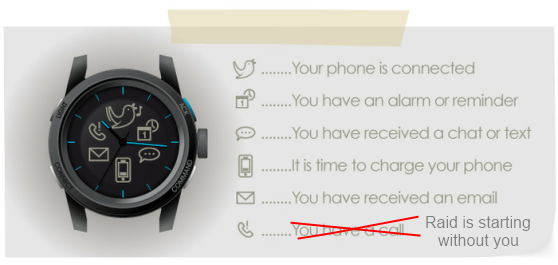
We all know about services like Foursquare, which track location data to show our friends where we are for social media. But what about using the same sort of service for games? Robert Bowling of Robotoki spoke the other day about how location-aware devices will play a part in the developer’s upcoming title, The Human Element.
[aditude-amp id="flyingcarpet" targeting='{"env":"staging","page_type":"article","post_id":485803,"post_type":"story","post_chan":"none","tags":null,"ai":false,"category":"none","all_categories":"games,mobile,","session":"C"}']This year is also the first time so-called “smart watches” are becoming available. These devices connect to our smartphones and offer application services right on our wrists. Some, like Sony’s SmartWatch, run applications natively. Others merely stream from the phone via Bluetooth.
The Cookoo watch isn’t a smart watch, according to creator Peter Hauser. It offers a simple system that pings the wearer with notifications about new emails, calls, tweets, or other social media updates without requiring you to hold your phone. It also can automatically check into locations using Foursquare, Facebook, or Twitter, and has an open SDK for developers to build their own functionality.
AI Weekly
The must-read newsletter for AI and Big Data industry written by Khari Johnson, Kyle Wiggers, and Seth Colaner.
Included with VentureBeat Insider and VentureBeat VIP memberships.
The project’s Kickstarter closes tomorrow morning.
While the watch itself looks like a decent timepiece, its allure to gamers is how a connected watch can work with games. Bowling’s example is just one of many possibilities. Massively multiplayer online games can benefit from such systems when players are “AFK” (which stands for “away from the keyboard,” meaning they’re out in the real world) by allowing them to actively participate in the game with the press of a button. “Having a piece of hardware that ties them to their alternate world,” Hauser said, “is unique for watches.”
Of course, all of the same applications could be done with just a smartphone, but therein lies Hauser’s major selling point. The phone lives in your pocket; a watch, which many have already replaced with a phone, is on the wrist and easy to hear and notice. It’s also discrete; we all accept that watches can beep, while phone ringtones can be equally embarrassing and annoying. The Cookoo makes check-in features and notifications a simple click or beep away. It can be used for everything from an Ebay bid reminder to direct messages on Eve Online.
Hardware companies like Logitech, Razer, SteelSeries, and plenty others already build specialty keyboards, mice, and other peripherals to meet the demands of an ever-growing userbase of gamers. Will gamers be interested in a watch that can quickly and efficiently help progress in a game while at work, shopping, or doing anything besides for playing?
It will take developers, and perhaps a few invested gamers who want an edge, to get the ball rolling on using a wristwatch to help play a game. Such technology isn’t limited to just the Cookoo watch, but with an open development kit, Hauser and team ConnecteDevice Ltd. is on the right path to making that possibility into a reality.
VentureBeat's mission is to be a digital town square for technical decision-makers to gain knowledge about transformative enterprise technology and transact. Learn More